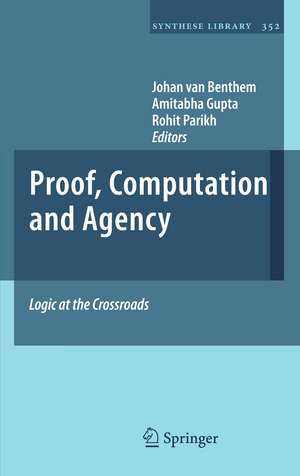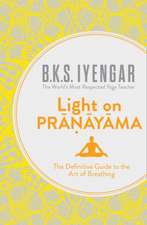Proof, Computation and Agency: Logic at the Crossroads: Synthese Library, cartea 352
Editat de Johan van Benthem, Amitabha Gupta, Rohit Parikhen Limba Engleză Paperback – 29 mai 2013
| Toate formatele și edițiile | Preț | Express |
|---|---|---|
| Paperback (1) | 949.23 lei 6-8 săpt. | |
| SPRINGER NETHERLANDS – 29 mai 2013 | 949.23 lei 6-8 săpt. | |
| Hardback (1) | 955.25 lei 6-8 săpt. | |
| SPRINGER NETHERLANDS – 7 apr 2011 | 955.25 lei 6-8 săpt. |
Din seria Synthese Library
- 15%
 Preț: 638.43 lei
Preț: 638.43 lei - 18%
 Preț: 989.98 lei
Preț: 989.98 lei - 15%
 Preț: 596.69 lei
Preț: 596.69 lei - 18%
 Preț: 903.93 lei
Preț: 903.93 lei - 15%
 Preț: 586.88 lei
Preț: 586.88 lei - 15%
 Preț: 696.50 lei
Preț: 696.50 lei - 18%
 Preț: 892.90 lei
Preț: 892.90 lei - 15%
 Preț: 643.34 lei
Preț: 643.34 lei -
 Preț: 282.33 lei
Preț: 282.33 lei - 5%
 Preț: 372.19 lei
Preț: 372.19 lei -
 Preț: 443.10 lei
Preț: 443.10 lei - 15%
 Preț: 637.59 lei
Preț: 637.59 lei - 18%
 Preț: 958.88 lei
Preț: 958.88 lei - 15%
 Preț: 642.36 lei
Preț: 642.36 lei - 18%
 Preț: 1230.66 lei
Preț: 1230.66 lei - 15%
 Preț: 642.83 lei
Preț: 642.83 lei - 18%
 Preț: 1000.39 lei
Preț: 1000.39 lei -
 Preț: 389.70 lei
Preț: 389.70 lei - 15%
 Preț: 637.28 lei
Preț: 637.28 lei - 18%
 Preț: 952.26 lei
Preț: 952.26 lei - 18%
 Preț: 1231.32 lei
Preț: 1231.32 lei - 15%
 Preț: 645.96 lei
Preț: 645.96 lei -
 Preț: 395.85 lei
Preț: 395.85 lei -
 Preț: 400.47 lei
Preț: 400.47 lei - 18%
 Preț: 1225.48 lei
Preț: 1225.48 lei - 15%
 Preț: 638.89 lei
Preț: 638.89 lei - 18%
 Preț: 1232.09 lei
Preț: 1232.09 lei -
 Preț: 380.45 lei
Preț: 380.45 lei -
 Preț: 394.87 lei
Preț: 394.87 lei - 15%
 Preț: 640.37 lei
Preț: 640.37 lei - 15%
 Preț: 639.08 lei
Preț: 639.08 lei -
 Preț: 381.98 lei
Preț: 381.98 lei - 15%
 Preț: 643.00 lei
Preț: 643.00 lei - 15%
 Preț: 672.29 lei
Preț: 672.29 lei
Preț: 949.23 lei
Preț vechi: 1157.60 lei
-18% Nou
Puncte Express: 1424
Preț estimativ în valută:
181.63€ • 190.15$ • 150.29£
181.63€ • 190.15$ • 150.29£
Carte tipărită la comandă
Livrare economică 05-19 aprilie
Preluare comenzi: 021 569.72.76
Specificații
ISBN-13: 9789400735811
ISBN-10: 9400735812
Pagini: 396
Ilustrații: XXIV, 372 p.
Dimensiuni: 155 x 235 x 21 mm
Greutate: 0.55 kg
Ediția:2011
Editura: SPRINGER NETHERLANDS
Colecția Springer
Seria Synthese Library
Locul publicării:Dordrecht, Netherlands
ISBN-10: 9400735812
Pagini: 396
Ilustrații: XXIV, 372 p.
Dimensiuni: 155 x 235 x 21 mm
Greutate: 0.55 kg
Ediția:2011
Editura: SPRINGER NETHERLANDS
Colecția Springer
Seria Synthese Library
Locul publicării:Dordrecht, Netherlands
Public țintă
ResearchCuprins
Foreword.- Preface.- I LOGIC TODAY: SOME REFLECTIONS.- 1. What is Mathematical Logic? A Survey; John N. Crossley.- 2. Is there a Logic of Society?; Rohit Parikh.- II LOGIC AND MATHEMATICS.- 3. What is a Proof?; John N. Crossley.- 4. A Visit to Tarski's Seminar on Elimination of Quantifiers; Wilfrid Hodges.- 5. Deductive Systems of Fuzzy Logic; Petr Hájek.- III LOGIC AND COMPUTATION.- 6. What is the Difference between Proofs and Programs?; John N. Crossley.- 7. Zero-One Laws: Thesauri and Parametric Conditions; Andreas Blass and Yuri Gurevich.- 8. Recent Developments of Feedback Coding and its Relations with Many-valued Logic; Ferdinando Cicalese and Daniele Mundici.- 9. Two Applications of Epistemic Logic in Computer Security; Ron van der Meyden.- 10. An Introduction to Quantum Computing; Noson S. Yanofsky.- IV LOGIC, AGENCY AND GAMES.- 11. Logic Games: From Tools to Models of Interaction; Johan van Benthem.- 12. Iterated Belief Revision in Dynamic Doxastic Logic; Krister Segerberg.- 13. Towards a Logical Analysis of Adjusted Winner; Eric Pacuit.- 14. Temporal Logic with Preferences and Reasoning about Games; G. Venkatesh.- V LOGIC, LANGUAGE AND COGNITION.- 15. From Sentence Meanings to Full Semantics; Wilfrid Hodges.- 16. Some Reflections on Discrete Mathematical Models in Behavioral, Cognitive and Social Sciences; B. D. Acharya and Shalini Joshi.- VI PERSPECTIVES FROM INDIAN LOGIC.- 17. History and Development of Indian Logic: An Overview; K. Ramasubramanian.- 18. Indian Logic and Philosophy of Science: the Logic-Epistemology Link; Sundar Sarukkai.- 19. The Concept of ‘Hetvabhasa’ in Nyaya-sastra; K. Ramasubramanian.
Textul de pe ultima copertă
Proof, Computation and Agency: Logic at the Crossroads provides an overview of modern logic and its relationship with other disciplines. As a highlight, several articles pursue an inspiring paradigm called 'social software', which studies patterns of social interaction using techniques from logic and computer science. The book also demonstrates how logic can join forces with game theory and social choice theory. A second main line is the logic-language-cognition connection, where the articles collected here bring several fresh perspectives. Finally, the book takes up Indian logic and its connections with epistemology and the philosophy of science, showing how these topics run naturally into each other.
Caracteristici
offers a mixture of well-established authors and a new generation of feminist scholars the relative dearth of collected volumes devoted to feminist epistemology in the last decade lends significance to the broad-ranging collection represents significant developments in the field, building on the previous generation of work in the 1990s part of the Springer series on feminist philosophy











